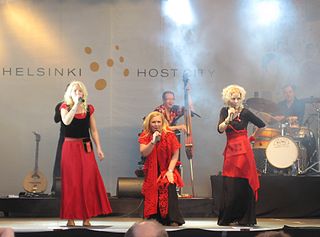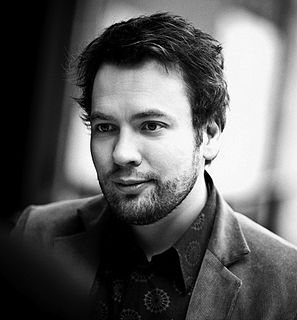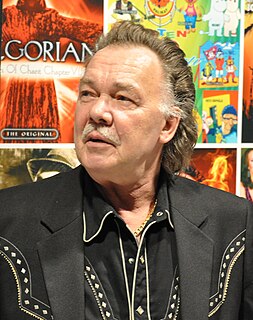The music of Finland can be roughly divided into categories of folk music, classical and contemporary art music, and contemporary popular music.

Sanna Laura Voutilainen is a Finnish pop singer.

Seinäjoki is a city located in South Ostrobothnia, Finland; 80 kilometres (50 mi) east of Vaasa, 178 kilometres (111 mi) north of Tampere, 193 kilometres (120 mi) west of Jyväskylä and 324 kilometres (201 mi) southwest of Oulu. Seinäjoki originated around the Östermyra bruk iron and gunpowder factories founded in 1798. Seinäjoki became a municipality in 1868, market town in 1931 and town in 1960. In 2005, the municipality of Peräseinäjoki was merged into Seinäjoki, and in the beginning of 2009, the neighbouring municipalities of Nurmo and Ylistaro were consolidated with Seinäjoki. Seinäjoki is one of the fastest growing regional centers in Finland.

Värttinä is a Finnish folk music band that started as a project by Sari and Mari Kaasinen in 1983 in the village of Rääkkylä, in Karelia, the southeastern region of Finland. Many transformations have taken place in the band since then. Värttinä shot into fame with the release of their 1991 album Oi Dai. As of 2009, the band consists of three lead female vocalists supported by three acoustic musicians. The vocalists sing in the Karelian dialect of the Finnish language.

Jonne Valtonen is a Finnish composer, arranger and orchestrator. He is renowned for his contributions in the field of demoscene and tracker music, under the name Purple Motion, and with Future Crew.

Jari Veikko Sillanpää is a Finnish-Swedish singer. With over 820,000 records sold, he is the fifth-best-selling music artist and second-best-selling solo artist in Finland.
Frank McNamara is an internationally known arranger, conductor, composer, and pianist from Ireland.

Arja Koriseva is a Finnish singer. She first came to fame as a tango singer; her repertoire now includes evergreen, pop, musical theatre, and sacred music.
The Tangomarkkinat is the world's oldest tango festival. It is held early every July in Seinäjoki, Finland. As well as competitions to find the country's best tango singers, composers, and dancers, the festival features public dancing to live music provided by the best Finnish entertainers. Music for public dancing is not restricted to tango: it includes all the dance rhythms popular in Finland: but tango content must, according to the rules, be at least 40%.
Taina Kokkonen is a former award-winning Finnish singer.
Finland was represented by Jari Sillanpää in the Eurovision Song Contest 2004 with the song "Takes 2 to Tango". Finland placed 14th with 51 points in the semi-final and so did not qualify for the final.

Aarne Tapani Kansa is a Finnish singer.

Kari Tapani Jalkanen, better known by his stage name Kari Tapio, was a Finnish schlager and country & western singer. During his career, he was one of the most popular singers in Finland for decades; having sold over 830,000 certified records, he is the best-selling soloist in the country. Kari Tapio was born in Suonenjoki, Finland. In the 1960s he performed in his home town Pieksämäki with the local bands ER-Quartet and Jami & The Noisemakers. In 1966 he took singing lessons from Ture Ara.

Ailamari Vehviläinen is a Finnish singer. She first came to fame as a tango singer; she extended her repertoire to include evergreens, Finnish pop, musical theatre, and sacred music; but after what was described as one of the most disgraceful episodes to besmirch Finnish television, she has disappeared from the public gaze.

Kaija Pohjola is a Finnish singer. She first came to fame as a tango singer; now her repertoire includes evergreens and Finnish pop.

Saule Sabitovna Iskakova is a Kazakhstan-born Russian actress (voice).

Kaija Lustila is a Finnish singer. She first came to fame as a tango singer; now her repertoire includes evergreens, iskelmä and Finnish pop.
Finland participated in the Eurovision Song Contest 2011 in Düsseldorf, Germany and selected their entry through Euroviisut 2011, organised by Finnish broadcaster Yleisradio (Yle). The final was broadcast Full HD 1080p via the Yle HD channel.

Taavi Vartia is a Finnish Film director, script writer and writer. Taavi Vartia has since 1990 planned, directed and produced programmes for all of Finland's national television channels: YLE TV1, YLE TV2, MTV3 and Nelonen, across a range of genres including drama, entertainment, music, profiles and documentaries. He has been involved in the production of over 1100 episodes. Vartia has also written and directed several company- and image videos for Finnish companies. In recent years he has received recognition as a writer of young adult dramas and as a documentary film maker. Vartia has published four novels. Vartia founded Taaborin kesäteatteri/ Taabori Summer Theater in Nurmijärvi 2009 and started to run the movie theatre Kino Juha 2019.

Erika Vikman is a Finnish singer and songwriter. Beginning her career as a Finnish tango singer, Vikman first received recognition after winning Tangomarkkinat in 2016. She later received further nationwide attention following the release of the single "Cicciolina" in 2020, which became her first top five hit in Finland. Her debut self-titled studio album was released the following year, and topped the charts in Finland.














